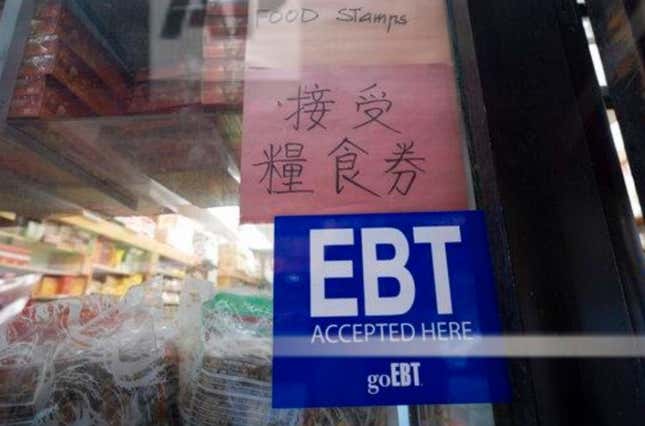
A federal judge scored one for people who don’t hate poor people on Sunday by striking down a ruling by the Trump administration that could have stripped food stamps from nearly 700,000 people during an ongoing global pandemic that has caused an enormous surge in unemployment in America.
CNN reports that the rule put forth by the administration limited the ability of states to waive existing work mandates that are required for non-disabled adults to receive food stamps. It was announced in December and was scheduled to take effect on April 1 but was blocked on March 13—the same day President Trump declared the coronavirus pandemic a national emergency—by Chief Judge Beryl Howell of the US District Court in Washington, DC, the same judge who struck the rule down Sunday.
From CNN:
The requirement could have resulted in 688,000 non-disabled, working-age adults without dependents losing their Supplemental Nutrition Assistance Program benefits, or SNAP, as food stamps are formally known, according to Agriculture Department estimates, which were calculated prior to the pandemic. It was expected to save $5.5 billion over five years.
Food stamp enrollment has soared during the outbreak as millions of Americans lost their jobs. More than 6 million people have signed up for benefits, as of May, a 17% increase, according to the ruling.
Nearly 43 million Americans were receiving benefits in April, according to the latest Agriculture Department data.
Hunger has risen amid the economic upheaval wrought by the pandemic. Many lined up at food banks, which distributed more than 1.9 billion meals between March and June, according to Feeding America, a network of 200 food banks and 60,000 food pantries and meal programs.
Some 10% of adults live in households where there was either sometimes or often not enough to eat in the last seven days, according to a Census Bureau survey from mid- to late-September.
In normal times, the food stamp program requires non-disabled, working-age adults without dependents to have jobs. They can only receive benefits for three months out of every 36-month period unless they are working or participating in training programs 20 hours a week. There were 2.9 million of these recipients in 2018 and nearly 74% of them were not employed, according to the agency.
A coalition of attorneys general from 19 states, the District of Columbia and the City of New York filed a lawsuit in January, challenging the rule brought on by the US Department of Agriculture.
According to the Washington Post, Judge Howell granted a summary judgment to the coalition and wrote in a 67-page ruling that the USDA’s rule “radically and abruptly alters decades of regulatory practice, leaving States scrambling and exponentially increasing food insecurity for tens of thousands of Americans,” and that the department “has been icily silent about how many would have been denied SNAP benefits had the changes sought...been in effect while the pandemic rapidly spread across the country.”
Ultimately, Howell ruled that the department’s “utter failure to address the issue renders the agency action arbitrary and capricious.”
After Howell blocked the Trump administration ruling in March, Congress waived work mandates for food stamp recipients for the duration of the national emergency as part of a coronavirus relief package that month. But the USDA appealed the judge’s order and the mandate would have taken effect if not for the second intervention by Howell on Sunday.
According to the Post, New York Attorney General Letitia James said in a statement that the decision is “a win for common sense and basic human decency.” She also said that the rule—which aimed to cut nearly $5.5 billion in food stamp spending over five years—“would have not only made it harder for thousands to feed their families and risk them going hungry but would have exacerbated the public health crisis we face and the economic recession we are still in the midst of under President Trump.”
Unfortunately, the work mandate is only one of three rules the current administration is looking to implement in order to reduce food stamp spending.
From the Post:
Two other proposed rule changes, not yet final, aim to cap deductions for utility allowance and to limit access to SNAP for working poor families.
A study by the Urban Institute indicated the combined impact of these rules would cut 3.7 million people from SNAP in an average month. Benefits would be reduced for millions more, and 982,000 students would lose automatic access to free or reduced-price school meals.



